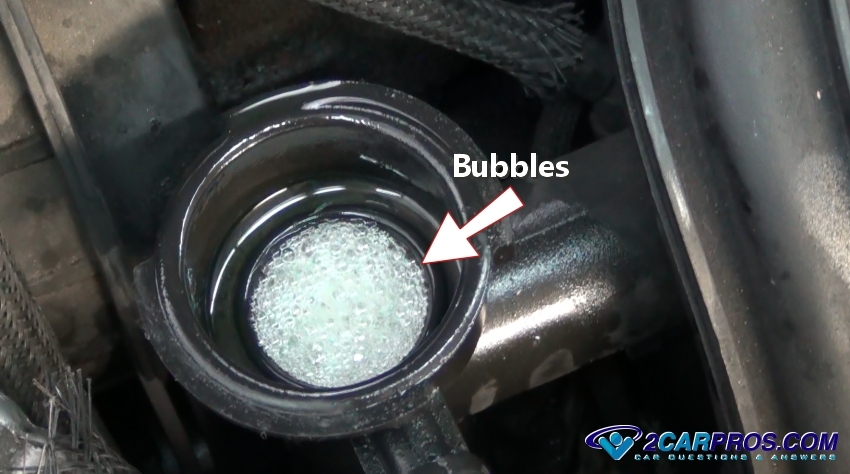A bubbling sound in a car typically indicates a cooling system issue. This noise often suggests trapped air or boiling coolant.
When your car starts making unusual noises, it’s vital to pay attention, as they can be early warning signs of mechanical problems. A bubbling sound coming from the engine area, specifically, points to a potential problem with the vehicle’s cooling system.
It’s not something to ignore, as the cooling system is crucial for preventing engine overheating and avoiding serious damage. This sound may be due to air entering the cooling system, a coolant leak, a failing water pump, or a malfunctioning radiator cap. Early diagnosis and repair are essential to ensure safe driving and the longevity of your car’s engine. It’s also important for maintaining the value of your vehicle and avoiding costly repairs down the line. Remember, regular maintenance checks can help prevent such issues and keep your car running smoothly.
The Mystery Of The Bubbling Sound
Drivers often encounter unexpected noises from their vehicles. A common, puzzling sound is a bubbling noise. This sound sparks concern and curiosity. Understanding its origin is crucial for car health.
Identifying The Noise
Bubbling noises in a car can be alarming. They usually indicate fluid movement within the vehicle. It’s essential to pinpoint where and when the sound occurs. This helps diagnose the issue promptly.
When Does The Sound Occur?
The timing of the bubbling sound can offer clues. Does it happen at startup, during driving, or after turning the engine off? Noting these details aids in accurate troubleshooting.
- Startup: Could signal a coolant system problem.
- While driving: May suggest overheating or a leak.
- Engine off: Possibly a sign of escaping gases.
| Sound Timing | Possible Causes |
|---|---|
| Startup | Coolant issues |
| Driving | Overheating or leaks |
| Engine Off | Gas escape |
Listening closely to your car’s sounds is vital. It ensures the vehicle stays in top condition. Immediate attention to strange noises like bubbling can prevent larger issues.

Credit: www.reddit.com
Common Culprits Behind The Bubbling
Common Culprits Behind the Bubbling often confuse car owners. A car making a bubbling sound can point to issues needing immediate attention. Let’s explore the usual suspects.
Coolant System Insights
The coolant system plays a crucial role in your car. It keeps the engine from overheating. A bubbling sound might mean a problem here. Let’s break it down:
- Leaky Radiator Cap: It can’t hold pressure anymore. This leads to bubbling noises.
- Low Coolant Level: Less coolant means more air. Air in the system creates bubbles and noise.
- Overheating Engine: Too hot, and your coolant boils. This boiling sounds like bubbling.
Troubles In The Fuel System
Your car’s fuel system can also cause bubbling sounds. This is less common but worth checking. Here are a few insights:
- Fuel Pump Issues: A failing pump might make a bubbling or whirring noise.
- Blocked Fuel Line: Blockages can cause pressure build-up. This pressure then releases, sounding like bubbles popping.
Both systems are vital for your car. Ignoring these signs can lead to bigger problems. Regular check-ups help catch these issues early.
Under The Hood: The Cooling System
Under the Hood: The Cooling System keeps your car from overheating. It’s a vital part of your vehicle. A bubbling sound may signal trouble. It’s essential to check the system regularly. Let’s dive into key components and maintenance tips.
Radiator And Reservoir Checks
Your radiator works hard to cool the engine. The reservoir holds excess coolant. Both need regular checks to function well.
- Inspect the radiator for leaks or rust.
- Check coolant levels in the reservoir.
- Ensure caps seal properly and hoses are intact.
Thermostat Troubleshooting
The thermostat controls coolant flow. It opens and closes at set temperatures. A faulty thermostat may cause overheating.
- Observe the temperature gauge for irregularities.
- Watch for fluctuations in engine heat.
- Replace the thermostat if it fails to regulate temperatures.
Fluid Dynamics: Brake And Transmission Fluids
Understanding fluid dynamics in cars is key. It ensures smooth operation. Brake and transmission fluids are vital. They must remain pure and air-free. Any bubbling sound in these fluids can signal trouble. Let’s explore what these bubbles mean for your car’s health.
Brake Fluid Bubbles
Brake fluid is a hydraulic liquid. It transfers force into pressure. It operates under high temperatures. Bubbles in brake fluid can reduce braking power. This is risky. Bubbles form due to air intrusion or moisture contamination. Regular checks prevent this issue.
- Check fluid levels monthly.
- Inspect for leaks often.
- Flush system every two years.
Transmission Fluid Anomalies
Transmission fluid lubricates. It cools and cleans internal parts. Anomalies in this fluid can mean trouble. Watch for unusual color changes or burnt smells. These signs demand immediate attention.
| Color | Condition |
|---|---|
| Bright Red | Healthy |
| Brown/Black | Change needed |
Regular maintenance keeps transmission fluid healthy. Change it as recommended. Refer to your car’s manual for guidance.
The Exhaust System’s Role
The exhaust system plays a vital role in your car’s health. It removes harmful gases from the engine. A bubbling sound may indicate a problem here. Let’s explore key parts of the exhaust system.
Catalytic Converter Conditions
The catalytic converter is crucial for reducing pollution. It transforms harmful gases into less toxic substances. Signs of trouble include:
- Loud rattling noises
- A decrease in fuel efficiency
- An increase in exhaust emissions
Regular checks can prevent major issues. A failing converter may cause a bubbling sound.
Muffler And Tailpipe Examination
The muffler and tailpipe also affect exhaust sounds. Corrosion or holes can lead to unusual noises. Check these parts for:
- Visible holes or rust
- Water dripping, which indicates condensation buildup
- Loose fittings that might cause rattling sounds
A thorough examination helps spot issues early. This prevents costly repairs later.
Hvac System: Air Pockets And Leaks
When your car makes a bubbling sound, it might be the HVAC system. This system keeps your car’s temperature just right. But sometimes, air pockets or leaks happen. These can cause those strange sounds. Let’s explore common issues and how to fix them.
Heater Core Concerns
Heater cores warm up your car’s inside. A bubbling noise could mean trouble. It might be a leak or a clog. Leaks let air in, leading to those weird sounds. Clogs stop the flow, causing the same issue. Check the heater core right away if you hear bubbles.
- Inspect for leaks: Check for wet spots or steam.
- Check coolant levels: Low coolant can mean a leak.
- Watch temperature gauges: Overheating? Could be a core issue.
Ac System Evaluation
Your car’s AC keeps you cool. If it starts to bubble, it’s time to look closer. The AC system might have a leak or air trapped inside. An expert should check this. They use tools to find and fix any leaks.
| Sign | Possible Cause | Action |
|---|---|---|
| Bubbling sound | Leak or air pocket | Inspect system |
| Weak airflow | Clogged filter | Replace filter |
| Warm air | Refrigerant issue | Recharge AC |
A pro can spot leaks and recharge your AC. They make sure your car stays cool and quiet.
Professional Insight: When To Seek Help
Strange sounds from your car can be alarming. A bubbling noise may suggest a problem. It’s crucial to understand when professional help is necessary. Mechanics offer expert diagnosis and can prevent further damage to your vehicle. Addressing issues early saves money and ensures safety.
Mechanic’s Diagnostic Tools
Mechanics use advanced tools to find the issue. These include:
- Computerized scanners read car error codes.
- Pressure testers check for leaks in the cooling system.
- Stethoscopes detect unusual engine sounds.
Experts use these tools for accurate diagnoses. This helps them fix your car quickly.
The Cost Of Neglect
Ignoring a bubbling sound can lead to expensive repairs. Here’s what might happen:
| Issue | Possible Outcome |
|---|---|
| Overheating Engine | Engine damage, costly repairs |
| Coolant Leak | Engine failure, high replacement costs |
| Head Gasket Failure | Complete engine overhaul needed |
Seeking timely help prevents these issues. It also keeps repair costs down.

Credit: www.youtube.com
Diy Fixes And Maintenance Tips
Experiencing a bubbling sound in your car can be unsettling. But fear not, many issues can be fixed with a little DIY know-how. These maintenance tips and simple solutions might just save you a trip to the mechanic.
Simple Solutions To Try
Before you panic, try these quick fixes:
- Check coolant levels: Low coolant can cause bubbling. Refill if needed.
- Inspect hoses: Look for leaks or cracks in the radiator hoses. Replace if necessary.
- Tighten clamps: Loose clamps might lead to air entering the system. Make sure they’re snug.
- Bleed the system: Air pockets can form in the cooling system. Bleeding it may remove them.
Preventative Measures For Car Owners
To avoid future problems, stay proactive with these steps:
- Regularly check fluids: Ensure all fluids are at proper levels.
- Schedule maintenance: Keep up with your car’s service schedule.
- Listen for odd noises: Address strange sounds promptly.
- Monitor temperature gauge: Watch for signs of overheating.
Tools And Materials For The Home Mechanic
When a mysterious bubbling sound emerges from your car, it’s crucial to have the right tools and materials at your disposal. Home mechanics can tackle this issue with confidence. Here’s what you need to get started:
Essential Toolkit
Begin with a well-equipped toolkit. Quality tools make the job easier and safer. Your toolkit should include:
- Wrench set – for bolts and nuts
- Screwdrivers – both flathead and Phillips
- Pliers – for gripping and bending
- Ratchet and socket set – for tight spaces
- Wire brush – to clean connections
- Funnel – to add fluids without spilling
- Coolant tester – to check antifreeze levels
Safety And Precautionary Gear
Protect yourself while working on your vehicle. Safety comes first. Equip yourself with:
- Gloves – to guard against burns and cuts
- Goggles – to protect your eyes
- Ear protection – if using loud tools
- Work boots – to shield your feet
- Fire extinguisher – for unexpected fires
- First aid kit – for immediate treatment of injuries

Credit: www.2carpros.com
Conclusion: Restoring Quiet To Your Ride
Restoring quiet to your ride ends the worry of strange noises. A bubbling sound in your car can unsettle any drive. Let’s ensure your car stays silent and serene.
Key Takeaways
- Identify the cause of the bubbling sound quickly.
- Regular checks keep your car quiet.
- Seek professional help when needed.
Maintaining Car Health
Maintaining your car helps avoid unexpected noises. Here’s how:
- Check fluids often. Low levels can cause bubbling.
- Inspect hoses for leaks or damage.
- Listen for unusual sounds during drives.
- Schedule regular maintenance visits.
Following these steps keeps your car running smoothly. A quiet car means a happy driver. Remember, a well-cared-for car seldom makes unwanted noises.
Frequently Asked Questions
Why Is My Car Making A Bubbling Noise?
A bubbling sound in your car can indicate trapped air in the cooling system or a possible coolant leak. It’s essential to inspect the radiator and hoses for any signs of leakage.
Can A Bubbling Sound Mean Engine Trouble?
While a bubbling noise often points to cooling system issues, it can sometimes signal engine overheating. Check the temperature gauge and coolant levels to ensure proper engine operation.
What Should I Check For A Bubbling Sound?
Inspect the coolant reservoir for proper fluid level and look for any leaks. Additionally, check the radiator cap for a tight seal, as a loose cap can cause bubbling sounds.
How Do I Fix A Bubbling Noise In My Car?
Firstly, identify the source of the bubbling. If it’s a coolant issue, refill the coolant and bleed the system to remove air. For leaks, replace the affected hoses or radiator parts.
Is It Safe To Drive With A Bubbling Sound?
Driving with a bubbling sound can be risky if it’s due to overheating or a coolant leak. It’s best to address the problem promptly to avoid potential engine damage.
Conclusion
Dealing with a bubbling sound in your car can be unsettling, yet it’s often manageable. Regular check-ups and timely action are key. Remember, this noise could signal a minor issue or something more serious. Staying informed and proactive ensures your vehicle remains in top condition, safeguarding your road journeys ahead.

















